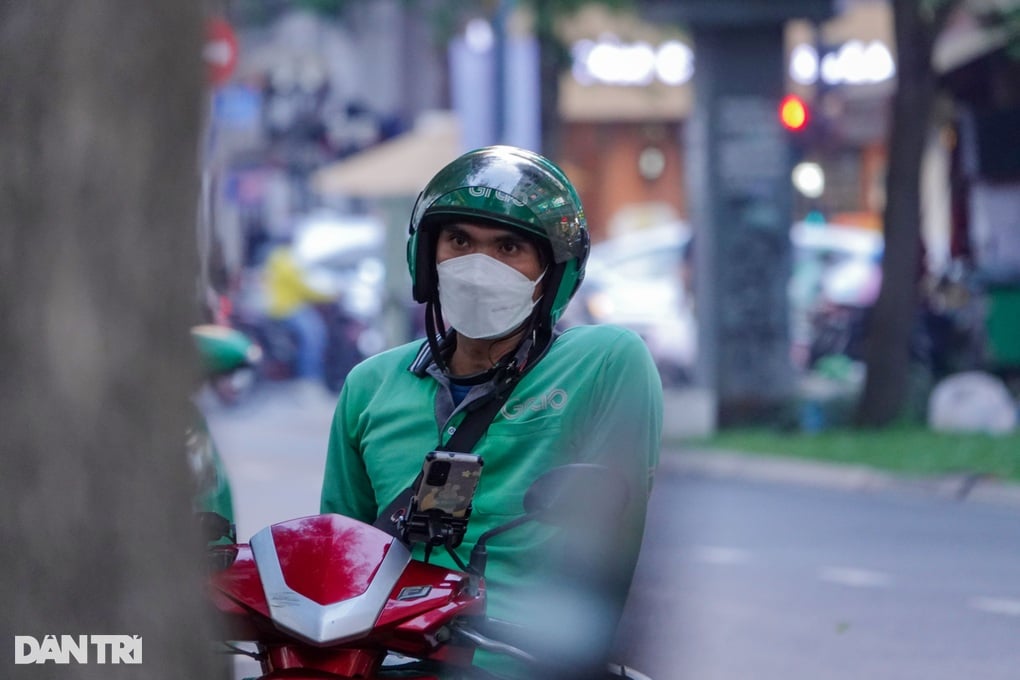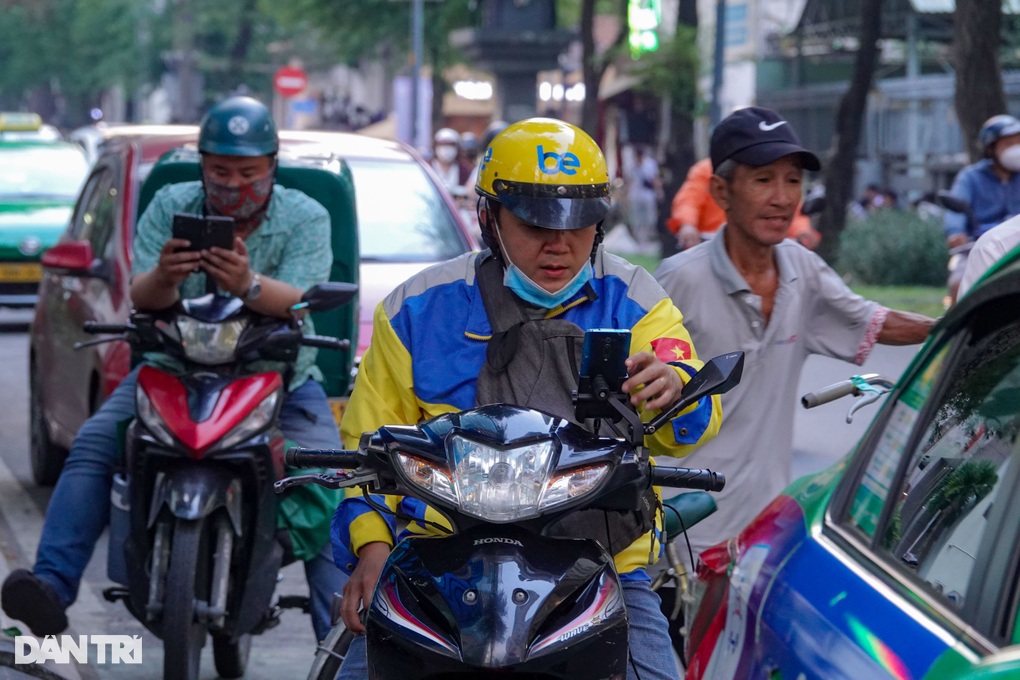No benefits
At 12 noon, Mr. Minh (50 years old, living in Ho Chi Minh City) put his motorbike's kickstand in front of a tall building, wiped his sweat and sighed. That was the building where he used to work as a restaurant manager with a salary of 30 million VND/month.
Until the restaurant cut staff, Mr. Minh was fired. At that time, he had to work as a motorbike taxi driver to earn money to support his family. Every day, Mr. Minh worked more than 10 hours to earn 7 million VND/month.

Low income, hard work, many drivers have to work 10-12 hours/day to have enough money to take care of themselves and their families (Illustration: Nguyen Vy).
With his income reduced by more than 4 times and no benefits from the company, Mr. Minh had to endure illnesses caused by the weather and pay for his own medical treatment when he was unfortunately involved in an accident on the road.
"Now we'll see, because at this age we don't know what to do. It's just a pity that if we could keep our old job, it would be much better, because in addition to a high salary, there are many other benefits," said Minh.
Around where Minh was taking his lunch break, many drivers were eating and waiting for rides while using their apps. Seeing this, he felt even more frustrated because the job of a driver was hard and the income was low due to too much competition.
Sympathizing with him, male driver Hoang (55 years old) confided that his income from being a driver was only enough to support himself. Therefore, his wife, who used to be a housewife, now has to find a part-time job to earn money to support the family of three.

Income has been cut in half compared to before, many drivers have had to take on extra jobs to increase their income (Illustration: Nguyen Vy).
Previously, drivers like Mr. Hoang could earn 700,000-800,000 VND for driving 10 hours a day. But this income is now only half.
So in the morning, Mr. Hoang will take advantage of the time to do another job. At noon, he continues his job as a driver until late at night.
This schedule has lasted for nearly 5 years, causing Mr. Hoang’s health to decline without any guarantee. The male driver has to spend money on car maintenance, pay for gas and pay for monthly medicine for his herniated disc.
Hesitant about the proposal to pay social insurance
Faced with risks at work, drivers are still quite hesitant about the proposal to be included in the group of subjects participating in compulsory social insurance.
"Before, when I worked at a restaurant, the company would deduct a portion of my salary to pay for social insurance. But now I work as a driver, my salary is much lower, if I still deduct my income to buy insurance, I would have no money left," said Mr. Minh.
Drivers only expect the company to be able to support the social insurance premium, but because there is no binding, they believe this is very unlikely.
"I never thought I would be able to participate in social insurance. Because my daily income is already very low, it would be very difficult to deduct my income to participate, even though I really want to. We can only hope that the company will support a part of this amount, then we can participate," driver Hoang confided.

With high occupational risks due to having to work on the streets, many drivers believe that it is difficult to participate in social insurance because of low income (Illustration: Nguyen Vy).
Associate Professor, Dr. Nguyen Duc Loc said that the management of car services using technology application platforms raises many complex issues in the management of business disputes between the traditional economic model and the sharing economic model.
Besides, socio -political organizations for workers and youth are currently quite confused in gathering and linking workers into their organizational model to care for and support their lives, contributing to ensuring security and order in the city.
According to the Study on assessing the current living conditions of workers and the practical management of technology-based vehicle service activities in Ho Chi Minh City (conducted by the Ho Chi Minh City Party Committee's Mass Mobilization Committee in coordination with the Institute for Social Life Research), most of these drivers previously had other jobs, and 27% of current technology vehicle drivers are now motorbike taxi or traditional taxi drivers.
Of these, 67% of drivers consider this a stable job. In addition, only 28% of drivers want to switch to another career.
Analysis shows that technology drivers have to spend a lot of money on vehicles, application software, taxes, living expenses, etc.
Among the 400 drivers surveyed, the loan amount of car drivers was more than 48 billion, equivalent to more than 350 million/car driver. The average loan amount for motorbike drivers was nearly 20 million/driver.
One of the drivers' expectations of state agencies is to ensure basic social security regimes; manage and regulate the number of participants to ensure living standards and harmonize the labor-employment structure.

In the survey, technology car drivers also expect that technology car companies have policies to support and ensure basic welfare for professional drivers (Illustration: Nguyen Vy).
From there, the study proposes that workers need to have professional recognition as a type of formal labor, protected by legal bases and state management agencies.
Redistribution of assets and redistribution of social welfare benefits gives them equal or better opportunities to rise to achieve social status equilibrium.
*Character names have been changed
On November 23, at the discussion session of the draft revised Law on Social Insurance, delegate Tran Thi Dieu Thuy (HCMC) expressed her opinion and agreed to add cases identified as employees but the two parties did not sign a labor contract or agreed to use another name to the group of additional subjects participating in compulsory social insurance.
Specifically, Ms. Thuy proposed to include technology car drivers or technology-based workers in the additional group participating in compulsory social insurance.
According to the female delegate, the freelance economy is growing strongly in Vietnam, technology car drivers and technology delivery workers are an important workforce in this field and are constantly increasing in number.
The above group of workers is also affected by many policies. When the technology company increases the sharing ratio by a few percentage points, the two parties have created a labor relationship.
Source link



















































![[Maritime News] More than 80% of global container shipping capacity is in the hands of MSC and major shipping alliances](https://vphoto.vietnam.vn/thumb/402x226/vietnam/resource/IMAGE/2025/7/16/6b4d586c984b4cbf8c5680352b9eaeb0)













































Comment (0)